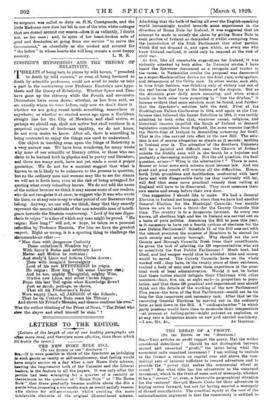LETTERS TO THE EDITOR.
[Letters of the length of one of our leading paragraphs are often more read, and therefore more effective, than those which fill treble the space.]
THE NEW HOME RULE BILL.
(To THE EDITOR OF THE " SPECTATOR."] Ana,—If it were possible to think of the Spectator as indulging In much gaudy as vanity or self-complacency, that feeling would kers ample excuse on a day when a new Home Rule scheme, bearing the imprimatur both of the Unionist and the Liberal leaders, is the feature in all the papers. It was only after the parties had been wrangling for a quarter of a century or thereabouts on the question of " Home Rule " or " No Home Rule " that there gradually became audible above the din a Fantle voice proposing a via media such as would satisfy reason- able claims for self-government whilst avoiding the more intolerable elements of the original ill-considered scheme. Admitting that the bulk of feeling all over the English-speaking world increasingly tended towards some- experiment in the direction of Home Rule for Ireland, it was suggested that an attempt be made to satisfy the claim by giving Home Rule to such portion of Ireland as demanded it whilst exempting from the jurisdiction of the Irish Parliament that other portion which did not demand it, and upon which, as every one who knew Ireland realized, it could only be imposed at the risk of civil war.
At first, like all reasonable suggestions for Ireland, it was violently attacked by both sides. In Unionist circles I have heard the Spectator denounced as a renegade and traitor to the cause: in Nationalist circles the proposal was denounced as a super-Machiavellian device for the final ruin, subjugation, and debasement of the Celtic race. In other words, each side, in true Irish fashion, was thinking only of victory and not of the real issues that lay at the bottom of the dispute. Bvt as the situation grew daily more menacing, and when armed bands on both sides were preparing to " line the ditches," it became evident that some solution must be found, and further that the Spectator's solution held the field. First at the Buckingham Palace Conference in 1914, and again at the Con- ference that followed the Easter Rebellion in 1916, it was tacitly admitted by both sides that, whatever racial, religions, and historical reasons impelled the South of Ireland to demand legislative separation from England, the same reasons justified the North-East of Ireland in demanding autonomy for itself. That is the idea carried into effect in the new Bill. The solu- tion is not of course altogether so simple as it sounds: nothing in Ireland ever is. The situation 'of the Southern Unionists will be a painful and difficult one; the Church of Ireland outside the Dublin area will in the South be a hopeless and probably a decreasing minority. But the old question, the final question, arises—" What is the alternative ? " There is none. Sooner or later some such scheme must become law. And one great and good result will overtop all the difficulties. Hence- forth Irish grumblers and faultfinders, confronted with hard facts and with disagreeable facts (as they inevitably will be), will find that some more practical remedy than railing at England will have to be discovered. They must consume their own smoke and sweep before their own door.
One suggestion I should like to make. We had a General Election in Ireland not long ago; since then we have had another General Election for the Municipal Councils; two months hence we are to have a third—for the County Councils this time. The country is in a dangerous ferment. As every one knows, all elections high and low in Ireland are carried out on a basis of pure politics. Assuming the Bill to pass this year, is it necessary to have yet a fourth cyclone of elections for the new Dublin Parliament? Schedule II. of the Bill sets out with the utmost precision the number of Members to be elected for each county and county borough. Why should not the new County and Borough Councils, fresh from their constituents, be given the task of selecting the 128 representatives who are to constitute the first Dublin Parliament P Much heat, bad blood, and bad temper would thus be avoided time and money would be saved. The County Councils have on the whole worked well: they have, in the twenty years of their existence, trained a body of men and given them experience in the prac- tical work of local administration. Would it not be better that these bodies should delegate their Chairman with other members—four, five, six, or eight each—in proportion to popu- lation, and that these 128 practical and experienced men should think out the details of the working of the now Parliament? Five years—the term of the first Parliament—would not be too long for this important and necessary task. After that let the recurring General Elections be carried out in the ordinary form as laid down in the Bill. A " cooling-chamber " in which party passions would have time to moderate their temperature —at present at boiling-point--might prevent an explosion, or at any rate a dangerous strain on new and untried machinery.










































 Previous page
Previous page